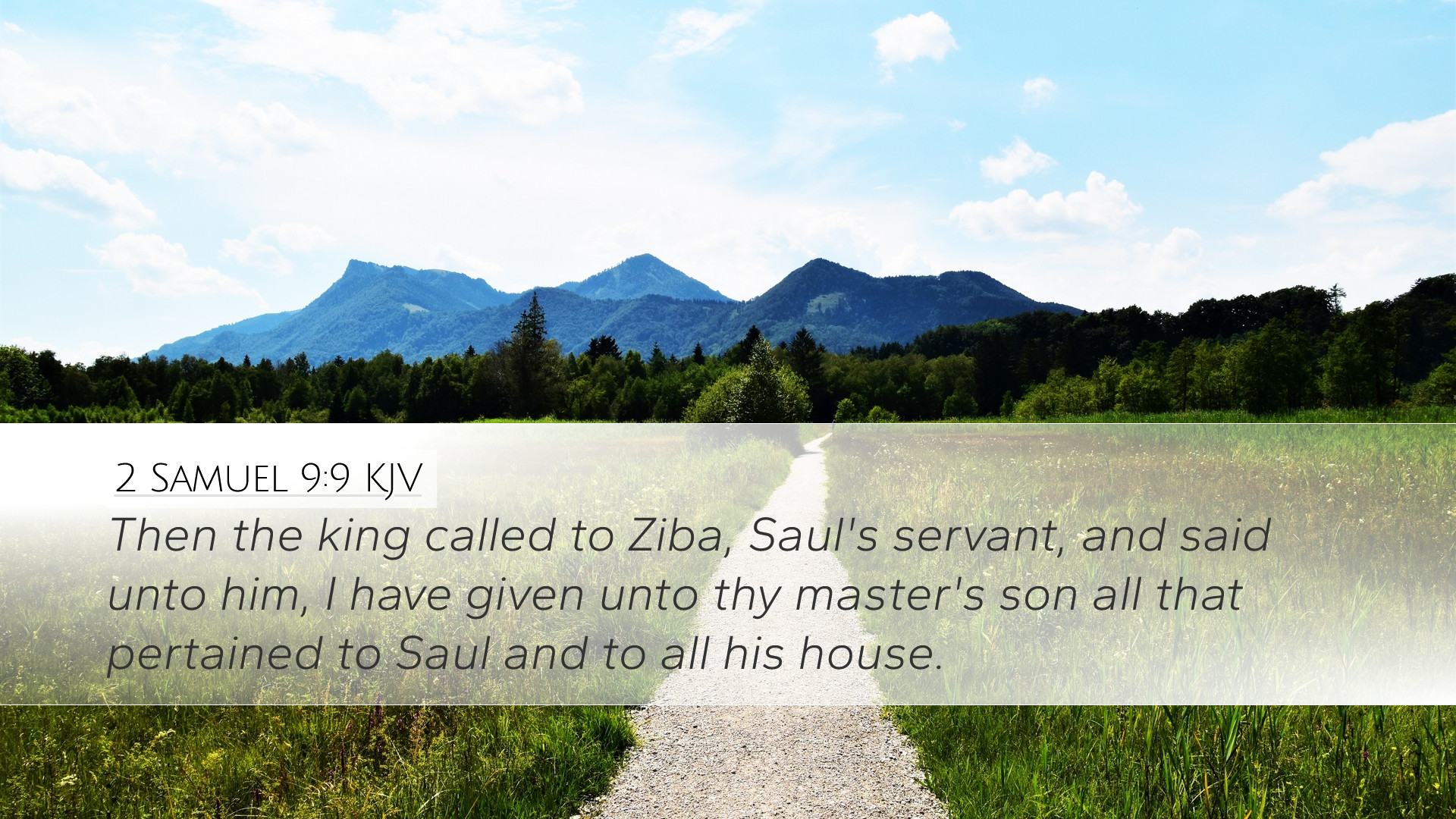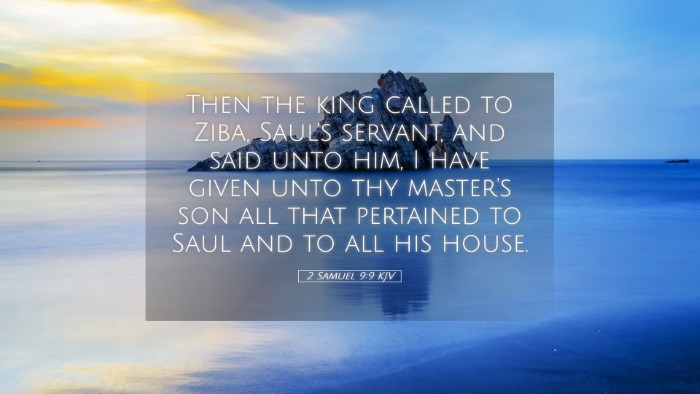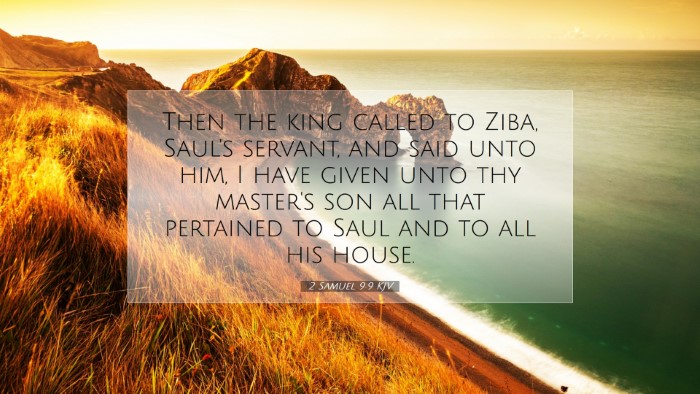Old Testament
Genesis Exodus Leviticus Numbers Deuteronomy Joshua Judges Ruth 1 Samuel 2 Samuel 1 Kings 2 Kings 1 Chronicles 2 Chronicles Ezra Nehemiah Esther Job Psalms Proverbs Ecclesiastes Song of Solomon Isaiah Jeremiah Lamentations Ezekiel Daniel Hosea Joel Amos Obadiah Jonah Micah Nahum Habakkuk Zephaniah Haggai Zechariah Malachi2 Samuel 9:9
2 Samuel 9:9 KJV
Then the king called to Ziba, Saul's servant, and said unto him, I have given unto thy master's son all that pertained to Saul and to all his house.
2 Samuel 9:9 Bible Commentary
Commentary on 2 Samuel 9:9
2 Samuel 9:9 states, "Then the king called to Ziba, Saul's servant, and said unto him, I have given unto thy master's son all that pertained to Saul and to all his house." This verse marks a significant moment in David's reign where he extends kindness to Mephibosheth, the son of Jonathan and grandson of Saul.
Historical Context
To truly grasp the weight of this verse, one must consider the historical backdrop of David's kingship. After a long period of conflict and strife, David has finally ascended to the throne of Israel. His relationship with Saul, who repeatedly sought to kill him, adds complexity to his interactions with Saul's family. David's actions in this chapter reflect both political savvy and deep loyalty to his covenant with Jonathan.
Divine Providence and Kindness
David’s call for Ziba, Saul's servant, reflects God’s providential plan. David’s choice to elevate Mephibosheth serves as a poignant reminder of God's grace. As Matthew Henry notes, “David, in seeking whom he might show kindness, is a type of Christ.” This foreshadows the New Testament theme of grace extended to the unworthy.
1. The Nature of Kindness
David's kindness towards Mephibosheth is illustrative of the grace of God, which does not consider the worthiness of the recipient. Albert Barnes comments, “David’s compassion is a model of unmerited love, reminiscent of God’s love toward sinful humanity.” This reflection encourages believers to mirror such kindness in their relationships.
2. Restoration of Inheritance
The act of restoring Saul's land to Mephibosheth is profound. Adam Clarke emphasizes, “This not only reflects David's mercy but also reinstates the rightful heir of Saul, preserving lineage and legacy.” Furthermore, it signifies the restoration of the brokenness that comes from conflict and war.
The Role of Ziba
Ziba's role as Saul's servant adds another layer of complexity. David's first action is towards the servant who has connections to Saul. Ziba’s response to David is telling; he is immediately moved to serve. This response showcases themes of loyalty and service. Henry notes, “Ziba representing the household of Saul is now called to serve the new king, highlighting the change of guard and providence of God in appointing David.”
Significance of Service
The service of Ziba reflects the transitional period in Israel’s monarchy. The shift from Saul to David is not merely administrative but profoundly spiritual as it speaks to the heart of God’s covenant people. Barnes observes that in serving David, Ziba becomes a participant in God's unfolding plan for Israel.
Mephibosheth’s Position
Mephibosheth's character is crucial to understanding the implications of this verse. He was born into royal lineage yet became a symbol of vulnerability due to his disability. Clarke provides insight into Mephibosheth's state, noting, “His lameness signifies the weakness and helplessness inherent in all humanity.”
Theological Reflection on Mephibosheth
Mephibosheth's situation evokes deeper theological themes. He embodies humanity in need of grace—this serves as a tangible picture of believers who are spiritually crippled and in need of Jesus. His humility in seeking David's favor mirrors the humility required to receive grace from God.
Conclusion
2 Samuel 9:9 stands as a testament to the kindness and faithfulness that characterize God's covenant. David’s actions toward Mephibosheth illuminate divine grace, a theme that resonates deeply in both the Old and New Testaments. As preachers and scholars delve into this passage, they are invited to reflect on their own lives and ministries: how can they show kindness and restore to others the inheritance of grace demonstrated by David? As Henry posits, “Our actions towards those less fortunate reflect our understanding of God’s grace towards us.”
Key Takeaways
- The Nature of Kindness: Reflects God's unmerited love.
- Restoration and Inheritance: Symbolizes God’s restoration in brokenness.
- Position of Service: Ziba’s role illustrates loyalty and transition.
- Spiritual Reflection: Mephibosheth as a symbol of human helplessness and grace.


